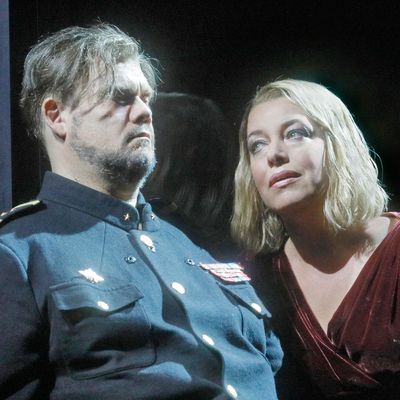
Editor’s note: This review was originally published in September 2016. We republish it today as the Metropolitan Opera, closed for the duration of the coronavirus pandemic, will be streaming video of this production tonight. It became available at 7:30 p.m. New York time and will be available for 20 hours thereafter. Full details here.
The Metropolitan Opera’s general manager, Peter Gelb, could do the art form a favor and order a moratorium on a whole catalogue of theatrical clichés: black-on-black décor punctuated by a blood-red dress in the final act; blinding high beams that strafe the stage from the wings; flashlights shining in the audience’s eyes; steel fire-stairs for clanking up and down; agitated waves projected on a scrim; hospital beds with IV stands; and slow-walking children conjured up in fever dreams. Above all, Gelb should order every black trench coat in the opera world mulched and make sure no lazy costume designer ever exhumes one again. All those and many more dead devices corrode Mariusz Trelinski’s portable staging of Wagner’s Tristan und Isolde, which started out in Baden-Baden, Germany, last spring, stopped briefly in Warsaw, and arrived at the Met in time for opening night. Eventually, it will move on to Beijing, but not soon enough.
The production’s grimness is a particular shame because it dampened the excitement of hearing a spectacular opening-night cast. The indomitable soprano Nina Stemme surfed almost nonchalantly over boiling orchestral oceans, and, five hours after her first syllable, got to the final spasms sounding as if she were ready to go another three acts. With her stamina, elegance, and mellifluous phrasing, Stemme ranged over the role’s emotional landscape, from pouty hauteur to suicidal bliss. Stuart Skelton emerged a little more bruised but equally proud: He sang much of the opera with a brassy clang and plenty of heroic intensity, but by the final scene his high register had coarsened into a bark. As Brangäne, Ekaterina Gubanova gripped her tentpole firmly in the gale of music, and René Pape exuded remorseful majesty as King Marke.
All this fine and urgent singing should have added up to a scorching performance (and still may, farther along in the run). But in keeping with the visual gloom onstage, conductor Simon Rattle kept blowing on the embers, now and then fanning them into flame but often producing only a dim glow of ecstasy. Rattle and the Met’s orchestra created long ravishing moments — the Act III Prelude, for instance — when Wagner’s dark shimmerings and deep-water swells seemed charged with life. He let the great English horn player Pedro Diaz deliver his solo with such powerful compassion that it seemed capable of cauterizing Tristan’s wounds. At other time, though, he conducted with caution, controlling crescendos and dosing the energy as if he feared a collapse.
I can only think that Rattle was trying not to let the music outshine the demoralizing business onstage. The opera opens on shipboard, and designer Boris Kudlička sets it in a more-or-less contemporary no-frills military vessel, the kind that might patrol waters nobody cares to defend. There is little respite from the steel-and-bilge-water décor once we make landfall in Cornwall. Isolde awaits Tristan in a storm-buffeted lighthouse, which gives Trelinski a chance to unleash a lot of snarling clouds and to shine more irritating spots at the audience. Later, the two doomed lovers spend a rhapsodic hour snuggling in a tin-sided warehouse amid steel shelving and barrels of toxic chemicals — the sort of place where TV thugs take their victims to make them talk. Surely Trelinski wants to show that love can transcend even such barren settings, that its internal light can flush the murk from any chic industrial grunge. It can: Whenever I shut my eyes and let the music lap around me, I was happy. But then I opened them again and saw two excellent singers shifting uncomfortably and undirected around the stage, and suddenly they looked un-transfigured. In the anchoring love scene, we know something erotic is afoot only because Skelton slips off his tie, though he doesn’t go so far as to undo any of the brass buttons on his navy uniform. Maybe at the next performance, Rattle could jump from the podium and tear them off for him, letting the heat rise unchecked.
Tristan und Isolde is at the Metropolitan Opera through October 27.


